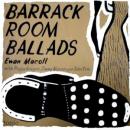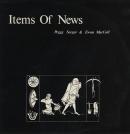Ore's a-waiting in the tubs, snow's upon t'fell,
Canny folks they're sleeping yet but lead is reet to sell,
Come, me little washer lad, come, let's away,
We're bound down to slavery for fourpence a day.
It's early in the morning we rise at five o'clock,
Little slaves come to the door to knock, knock, knock.
Come, me little washer lad, come, let's away,
It's very hard to work for fourpence a day.
Me father were a miner, he lived down in t' town,
’Twere hard work and poverty it always kept him down;
He aimed for me to go to school, but brass he couldn't pay,
So I had to go washing rake for fourpence a day.
Me mother rises out of bed with tears upon her cheek,
Puts me wallet on me shoulders, it has to last a week,
It often fills her great big heart when she to me does say,
I nivvor thought thaa'd 'av te work for fourpence a day.
And fourpence a day lad, the work is very hard,
Never a pleasant nod from a gruffy looking sod,
His conscience it may fail aye his heart it may gi'e way,
Then he'll raise us wages to ninepence a day.
Canny folks they're sleeping yet but lead is reet to sell,
Come, me little washer lad, come, let's away,
We're bound down to slavery for fourpence a day.
It's early in the morning we rise at five o'clock,
Little slaves come to the door to knock, knock, knock.
Come, me little washer lad, come, let's away,
It's very hard to work for fourpence a day.
Me father were a miner, he lived down in t' town,
’Twere hard work and poverty it always kept him down;
He aimed for me to go to school, but brass he couldn't pay,
So I had to go washing rake for fourpence a day.
Me mother rises out of bed with tears upon her cheek,
Puts me wallet on me shoulders, it has to last a week,
It often fills her great big heart when she to me does say,
I nivvor thought thaa'd 'av te work for fourpence a day.
And fourpence a day lad, the work is very hard,
Never a pleasant nod from a gruffy looking sod,
His conscience it may fail aye his heart it may gi'e way,
Then he'll raise us wages to ninepence a day.
inviata da Bernart - 24/7/2013 - 14:35
×
![]()









Canzone che Ewan MacColl apprese da tal John Gowland, un minatore in pensione di Middleton-in-Teesdale, nella contea inglese di Durham.
Nel disco “Shuttle and Cage” pubblicato nel 1957.
Una volta estratto dalla miniera il carbone va “lavato” per separare la frazione combustibile dal materiale sterile. Oggi l’operazione è automatica, attraverso macchinari che usano un processo gravimetrico basato su di una miscela di acqua e magnetite, ma un tempo veniva svolta a mano, ed erano i ragazzini dagli 8/9 anni in su a farlo, sottopagati e sfruttati peggio dei loro padri… Il “washer boy” o “coal-breaker boy” arrivava a lavorare fino a 12 ore al giorno per 4 centesimi di paga, o al massimo 9 per i ragazzi più grandi, quelli prossimi a scendere in miniera…